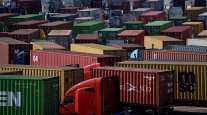Drop in Diesel Demand Heightens Recession Concerns

[Stay on top of transportation news: Get TTNews in your inbox.]
In China, the number of trucks running on highways is noticeably down in recent weeks. In Europe, diesel’s premium to crude futures recently plunged to the lowest level in more than a year. In the U.S., demand is on track to contract 2% in 2023, S&P Global Inc. says. Excluding 2020, when much of the economy briefly came to a standstill, that 2% slump would be the biggest drop in America’s diesel use since 2016.
We are “assuming one of the worst economic climates in recent memory outside of the 2008-2009 financial crisis and the pandemic,” said Debnil Chowdhury, S&P’s head of Americas fuels and refining.
No matter how you crunch it, demand for the heavy-machinery fuel that powers everything from commercial trucking fleets to construction equipment is weakening in many of the world’s largest economies. Viewed as an early signal of weaker industrial activity and reduced consumer spending, the pullback has recession-watchers on high alert.
“Diesel demand can act as a leading indicator for broader growth as an early sign that spending by households is waning,” said Ben Ayers, a senior economist in the U.S. with Nationwide Economics. “An expected drop in diesel demand fits with building recession risks across the economy.”
Once the world’s hottest fuel after Russia’s invasion of Ukraine disrupted trade flows, diesel prices have been coming down amid concerns many of the world’s biggest economies have bumpy roads ahead. Economists say there’s a 65% chance of a U.S. recession and a 49% chance of a European one within the next year. In China, the risk is lower but the country’s recovery from its formerly harsh COVID-19 restrictions will still require a marked improvement in consumer confidence, and fast.
Much of the pullback in diesel demand can be tied to trucking, which consumes about 60% of diesel in China and more than 70% in the U.S. The number of trucks running on Chinese highways fell 8% in the week ended April 9, according to data tracked by China’s Ministry of Transport. Commercial diesel stockpiles nationwide excluding state refineries ballooned to an eight-month high in early April, according to OilChem data.
The demand drop comes after China’s manufacturing activity eased unexpectedly in March, according to a private survey, leading a slide in factory gauges across Asia. Emerging markets in the region including Indonesia — where the government has started cutting subsidies for fuel — are also seeing demand weaken as growth slows, said Daphne Ho, senior analyst at Wood Mackenzie.
Similar trends are playing out in other parts of the world.
“European demand has been soft through winter on muted heating demand, and macro headwinds are clouding the demand outlook,” said Koen Wessels, senior oil products analyst at Energy Aspects Ltd.
In the U.S., trucking — and therefore, diesel — consumption has been hit by a decline in factory output, home construction and retailers working off high inventories, said Bob Costello, chief economist at industry group American Trucking Associations.

Costello
At the root of the U.S. trucking slowdown is a shift in consumer spending patterns: The steady stream of internet orders to fend off pandemic boredom has given way to vacations and experiences. As inflation squeezes household budgets, the first things people stop buying are what’s known in the trucking industry as “high-volume shippers,” or cheap consumer packaged goods like sodas.
Individual decisions like skipping soda add up to a macro impact that reduces the overall volume of goods that move through the economy. The drop in U.S. diesel demand will be especially pronounced on the West Coast, where massive tech-sector layoffs and an unfolding banking crisis have put the region under financial stress. There, diesel demand will slump 5% this year, more than twice the national average, said S&P’s Chowdhury.
U.S. container imports, a bellwether of diesel use from the trucks and trains that move them around the country, are also under pressure. In Los Angeles, inbound shipments are at their lowest level since March 2020. In China, which is shipping out many of those cargoes in the first place, throughput of containers at key ports fell 5% in the week ended April 9, according to data tracked by China’s Ministry of Transport.

Anthony Marshall of UPS shares the gold standard for an efficient and effective EV maintenance cycle. Hear the program above and at RoadSigns.TTNews.com.
“We see more downside than upside to Chinese diesel demand in the second half of the year,” said Mia Geng, head of China oil service at industry consultant FGE. “With global economic headwinds especially in the West, China will need to rely on domestic consumption to support its manufacturing activities.”
—With assistance from Julia Fanzeres.
Want more news? Listen to today's daily briefing below or go here for more info:




